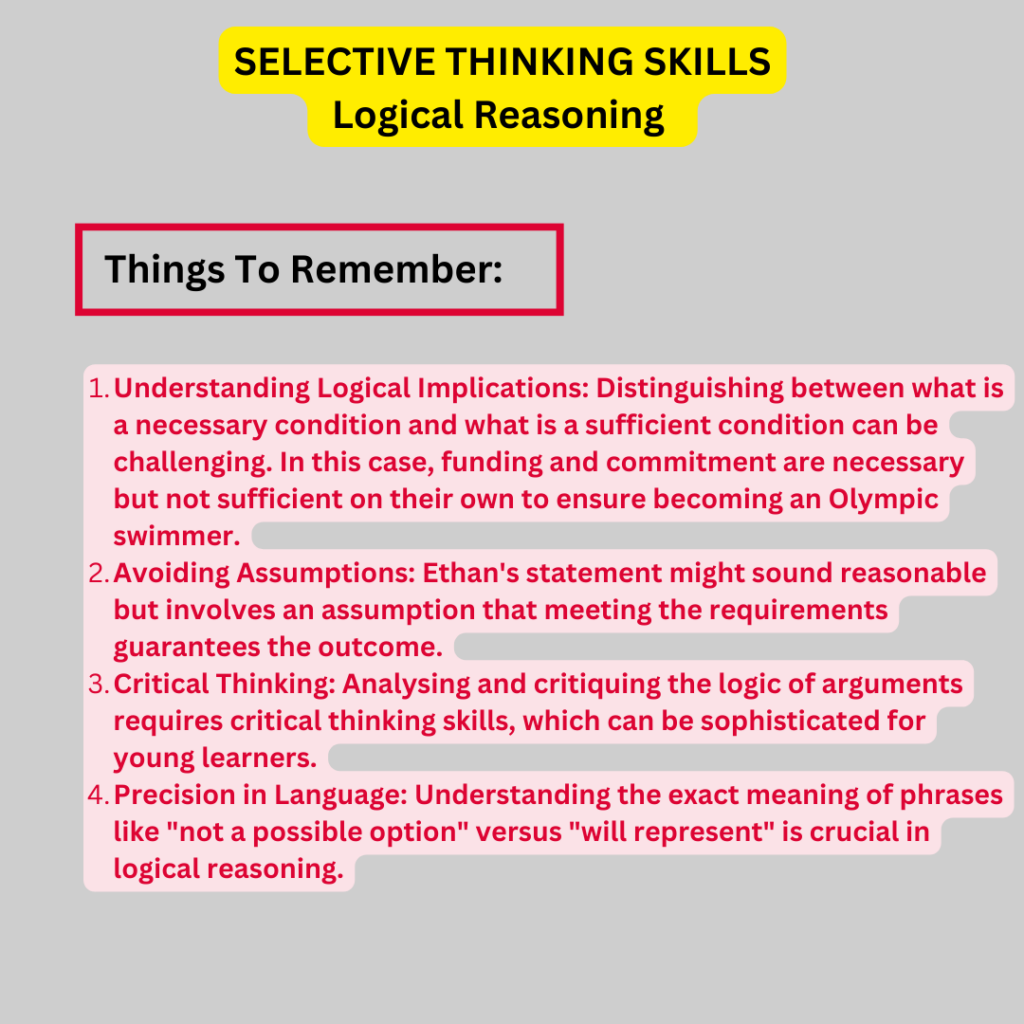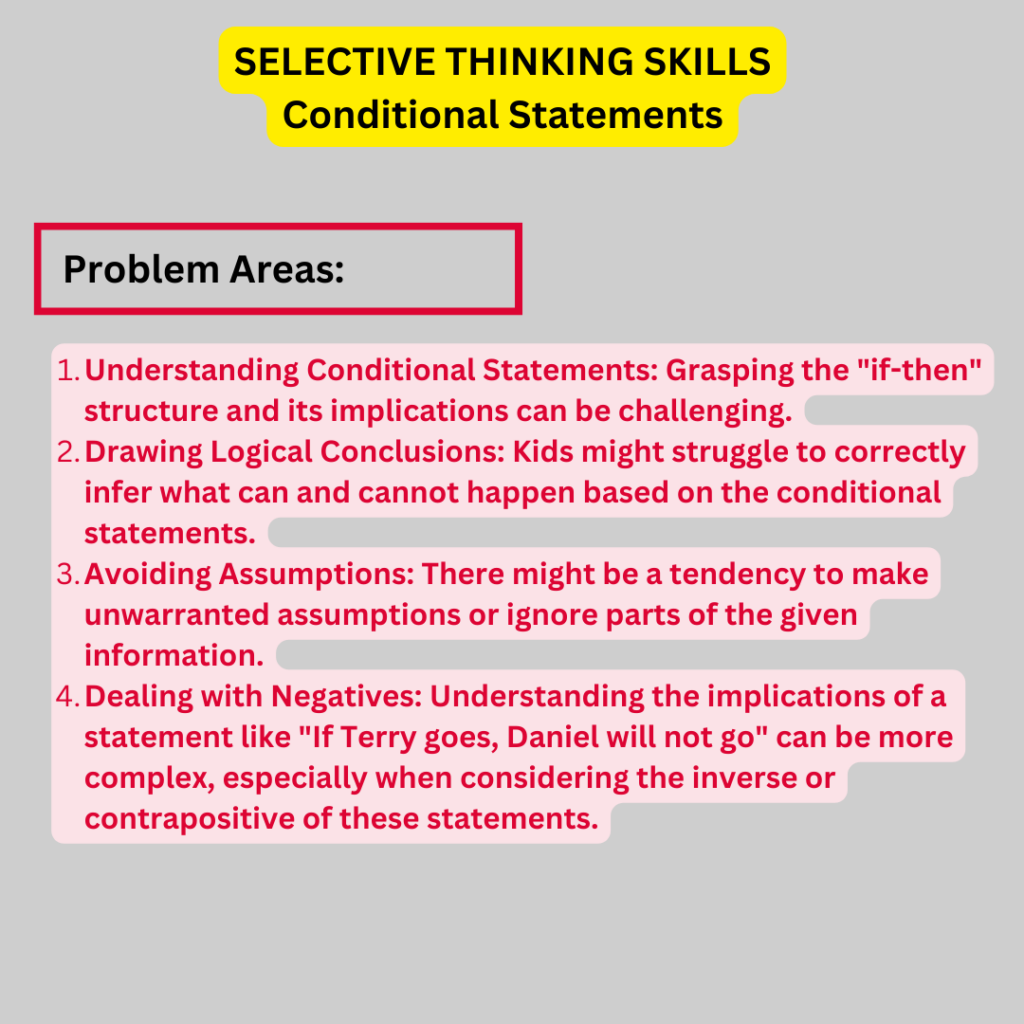SUBJECT SPECIALISATION: English, Writing, Math, Thinking Skills & Trial Test.
NSW Selective Test 2024: All You Need To Know About Thinking Skills
What Are The Core Question Types Specified by The Department of Education?
The term “core question types” refers to the fundamental categories or varieties of questions that are commonly used to evaluate thinking skills. These question types are designed to test different aspects of a student’s ability to think critically, logically, and analytically.
The New South Wales Department of Education has specified core question types that students must master. These include:
Logical Analysis: Tests the ability to analyse and evaluate arguments, looking at their structure and the soundness of their reasoning.
Evaluating Reasoning: Focuses on assessing the validity of reasoning in arguments, requiring the student to discern whether conclusions follow logically from premises.
Evaluating Evidence: Involves assessing how well evidence supports an argument, including identifying strong and weak arguments based on the evidence presented.
Identifying Mistakes: This type tests the ability to recognize logical fallacies or errors in reasoning, critical for critical thinking.
Finding Procedures: Challenges students to identify methods or steps required to solve a problem, often involving logical sequencing and problem-solving strategies.
Identifying Similarity: Involves comparing and contrasting different pieces of information, looking for patterns, similarities, or differences.
Guide Overview
What Does The 2023 Selective Thinking Skills Paper Tell Us?
A significant shift in the focus of thinking skills papers from 2021 to 2023 was an increased emphasis on problem-solving questions. This evolution indicates that students must be well-versed in a variety of question types, ranging from logical analysis to spatial reasoning.
The 2023 papers, for instance, demonstrated a dominance of problem-solving questions. This unpredictability underscores the necessity for students to prepare comprehensively.

Skills Required for Problem Solving Questions
Jen outlined several key skills essential for excelling in problem-solving questions:
- Mastery of Basic Mathematics Operations: This involves a solid understanding and application of fundamental mathematical concepts like addition, subtraction, multiplication, and division. Proficiency in these areas is essential not only for direct mathematical problem-solving but also for questions where numerical reasoning is required. This might include interpreting data, solving logical puzzles involving quantities, or making calculations based on given information.
- Ability to Filter Relevant Information: In many thinking skills questions, especially those involving large amounts of data or text, the key to finding the correct answer often lies in identifying the most pertinent pieces of information. This skill involves discerning which details are essential for solving a problem and which can be ignored. It’s particularly important in critical reasoning and problem-solving questions where extraneous information may be presented as a distraction.
- Spatial Reasoning in Both 2D and 3D Formats: Spatial reasoning refers to the ability to visualise and manipulate objects in space. In a 2D context, this might involve understanding and interpreting maps, diagrams, or patterns. In 3D, it extends to visualising how objects look from different angles, understanding the properties of three-dimensional shapes, and solving puzzles related to spatial layouts. This skill is crucial in questions that require visualising shapes and understanding spatial relationships.
- Logical Deduction and Understanding of Formal Logic: This involves the ability to reason logically and draw conclusions from a set of premises. It includes understanding and applying concepts such as syllogisms, conditional statements, and logical fallacies. Logical deduction is at the heart of many thinking skills assessments, as it requires students to follow a chain of reasoning to its logical conclusion, often in scenarios that are abstract or removed from everyday experience.
- Efficient Reading Strategies for Critical Reasoning Passages: Critical reasoning assessments often include lengthy passages that present arguments or complex scenarios. Efficient reading strategies are crucial for these sections. This includes skimming to get the main idea, scanning for key details, summarising arguments, and recognising structural elements such as the conclusion, evidence, and counterarguments. It also involves being able to read critically, identifying assumptions, biases, and strengths or weaknesses in the presented arguments.
Other Points to Keep In Mind for Thinking Skills
> Practice under timed conditions to improve time management and focus on weak areas through targeted practice.
> Maintain a mistake log to learn from errors and avoid repetition
> Use the CLARITY Framework Developed by Scholarly:
The Clarity framework, as described in the transcript, appears to be a comprehensive approach designed to enhance thinking skills, particularly in the context of preparing for selective school tests. This framework is built around several key components, each represented by a letter in the word “CLARITY”. Let’s break down each element:
- C – Curiosity: This component encourages students to foster a sense of wonder and inquiry. It’s about inspiring them to ask questions, explore different possibilities, and be open to learning and discovering new ideas. Cultivating curiosity is essential for creative thinking and for developing an interest in deeper understanding beyond just the surface-level facts.
- L – Learning Awareness: This aspect focuses on metacognition, which is essentially ‘thinking about thinking’. It involves students being conscious of their own learning processes, understanding how they learn best, and being able to self-regulate and adapt their learning strategies accordingly. This self-awareness is crucial for effective studying and for overcoming learning challenges.
- A – Adaptability: Adaptability in this context refers to the ability to adjust and be flexible in one’s thinking. This might mean being able to approach problems from different angles, adapt to new or unexpected types of questions, and adjust strategies as needed. In an exam setting, this is particularly important as it allows students to tackle a wide range of question types effectively.
- R – Reflective Practice: Reflective practice involves looking back at one’s own work and learning experiences to identify areas of improvement and success. This process is about learning from both mistakes and achievements to continuously improve and develop skills. It’s a key component of growth and development in any learning process.
- I – Intuitive Thinking: Developing intuitive thinking is about honing the ability to make quick, informed judgments. It’s a skill that involves using one’s experience and knowledge to make decisions when faced with new or complex problems. Intuition in thinking skills is particularly valuable in timed tests where quick thinking is essential.
- T – Theoretical Understanding: This refers to having a solid grasp of the underlying theories and concepts related to thinking skills. It’s about understanding the formal logic, reasoning principles, and conceptual frameworks that underpin the types of questions and problems students will encounter.
- Y – Yielding Insights: The final element focuses on applying all the above skills to gain deep insights and understanding. It’s about being able to translate theoretical knowledge and practiced skills into meaningful results, such as solving complex problems effectively or gaining new perspectives on an issue.

Conclusion: Final Thoughts by Our Thinking Skills Expert
> “The takeaway from this is that you can’t exactly predict what will happen… so you have to be prepared in all realms in all question types.”
– Jennifer Xu
> “Focus on your weaknesses, really do many drills and try to work out how you can mitigate any errors or mitigate any mistakes.”
– Jennifer Xu
> “See mistakes as opportunities for growth rather than obstacles to avoid.”
– Jennifer Xu
Need help navigating the NSW Selective Test 2024 and NSW Selective Test 2025? Reach out here: https://scholarlytraining.com/whatsapp











1 thought on “NSW Selective Test 2024: All You Need To Know About Thinking Skills”
Hello, its good piece of writing regarding media print, we alll understand media is
a fantastic source of facts. http://Boyarka-Inform.com/